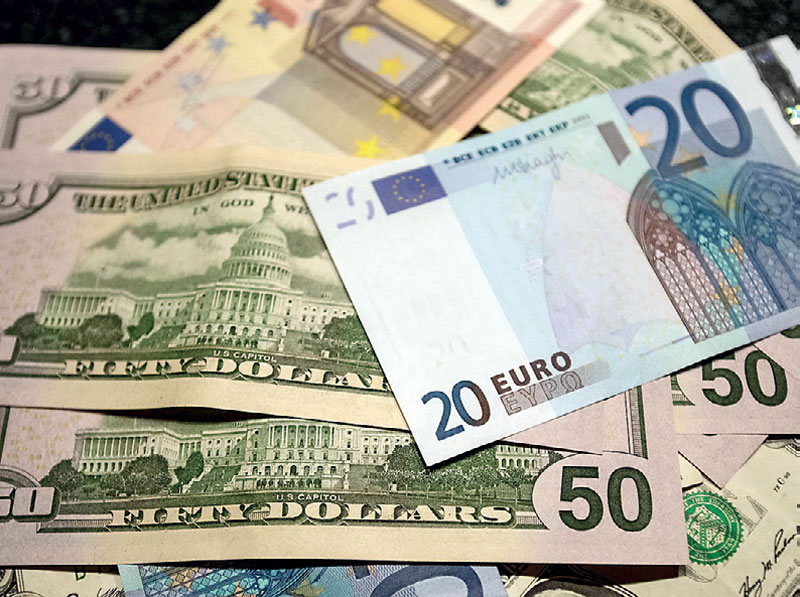Sunday Feb 22, 2026
Sunday Feb 22, 2026
Wednesday, 29 December 2021 01:16 - - {{hitsCtrl.values.hits}}

BRUSSELS, AFP: When 12 countries adopted the euro two decades ago, French President Jacques Chirac hailed a Europe that was “affirming its identity and its power”.
To the euro's most starry-eyed promoters, the currency was not only a leap of faith into European unity, but set up a rivalry with the US and its powerful dollar.
Dollar is (still) boss
But 20 years later, there is no question that the dollar still reigns supreme.
When the spread of the coronavirus shut down the world economy, the dollar's value jumped as investors poured into the safety of the world's de facto global currency.
More than $ 2.1 trillion are now in circulation, and about 60% of foreign-exchange reserves parked in central banks are denominated in dollars.
The euro's share is about 20%, according to the European Central Bank.
But even if it poses no direct threat to the hegemony of the greenback, Europe's single currency has been a respectable runner-up since it began circulating on 1 January 2002.
Bundesbank model
The single European currency is the child of a painful compromise between France and Germany, with Berlin abandoning its cherished deutschmark in return for Paris's backing of German reunification after the fall of the Berlin wall.
In the early days, the rules the European Central Bank placed on the euro took on a distinct German character in which stability – and stamping out inflation – was the only priority.
Making the euro a leading international currency “may have been the French view, but certainly not that of the German public,” said Guntram Wolff, director of Bruegel, a Brussels-based economic think tank. “When the ECB started operating, it was very much following the Bundesbank model, meaning being basically neutral on that question,” Wolff said.
In any case, the dream crashed against the rocks of the eurozone debt crisis. On its 10th birthday, the euro was fighting for its survival.
Trump attack
The idea of promoting the euro as a tool of power made its comeback with Donald Trump in the White House.
When Trump ditched the nuclear deal with Tehran, European companies that had rushed to invest in Iran found themselves under threat of US retribution.
The EU scrambled to set up a legal work-around to keep European firms out of Washington's crosshairs, but the effort failed as companies shuddered at the costs of defying the US and the long reach of the dollar.
Stung, EU leaders ordered the European Commission to work on ways to counter this weaponisation of the dollar.
The commission in January came out with some ideas, but not a legislative proposal.
Reality bites
A European official with close knowledge of the debate said that, since the departure of Trump, the issue had lost momentum.
And in any case, “when you talk about the international role of the euro, you're talking about everything and nothing at the same time”, the official said.
“Everybody agrees with the principle of having a bigger role for the euro in the world, but where disagreements emerge is how you get there.” Most agree that the missing magic ingredient is a safe asset, a euro equivalent to the US Treasury bond that since World War II has been the global investor's refuge in stormy markets.
The huge demand for euro-denominated bonds to help pay for the bloc's massive recovery fund to bounce back from the COVID-19 pandemic has only given sustenance to the argument.
But the creation of a eurobond equivalent of the US T-Bill has long been a no-go for richer member states like Germany or The Netherlands who fear paying off loans that benefit France, Spain or Greece, countries with heavy debts.
Wolff of the Bruegel institute said a eurobond would certainly “help things”. But what would work even better for the euro, he said, is a productive economy.
“If you have a dynamic economy, international investment will come to Europe and it will strengthen the euro as a currency,” he said.